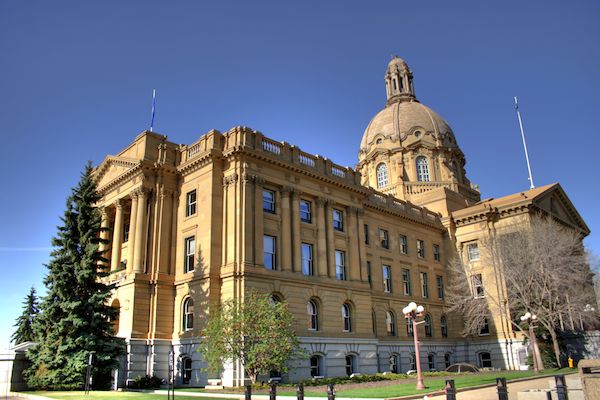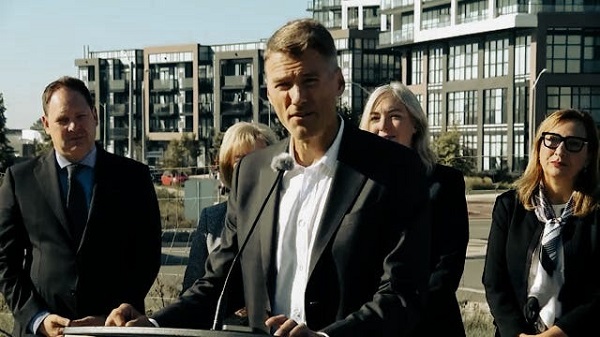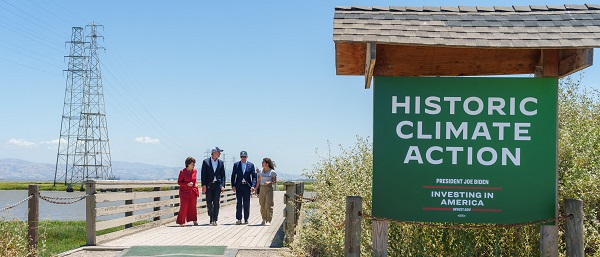Alberta
Quebec gets the exact child care deal Ottawa denied to Alberta! Province calling for a new agreement

Minister of Children’s Services Rebecca Schulz issued the following statement in response to the Quebec-Canada agreement on a Canada-wide early learning and child care system:
“Today, we’ve learned that the federal government and Quebec have agreed to a $6-billion child care agreement without conditions. This is the exact arrangement Ottawa rejected when Alberta asked for it this week and last week. Furthermore, when we asked Ottawa if any province would receive a straight transfer of child care dollars with no conditions attached, we were told no.
“This is dishonest, bad-faith negotiating from Ottawa right before an election. It’s frustrating to see Alberta parents could be left behind because of Prime Minister Justin Trudeau’s cynical pre-election manoeuvring especially given that we are absolutely committed to affordable, accessible child care that meets the diverse needs of Alberta kids and families.
“We believe we can reduce child care fees to $10 per day or less for low-income families and cut fees by an average of half, respecting the choices that many parents make including out-of-school care and overnight child care. That’s why we asked for the flexibility Quebec received today.
“We have an action plan that meets the goals of the federal government and is flexible enough to meet the needs of Alberta parents. We are optimistic that given Alberta’s continued investments in child care and the renewed bilateral agreement signed last month, we can come to a new agreement quickly. With an election call any day, we call on the federal government to give Alberta a fair deal and provide full child care funding without conditions through a signed early learning and child care agreement as soon as possible. Our economic recovery and working parents, especially women across this province, are counting on it.”
Alberta
Click here to help choose Alberta’s new licence plate design

Your province, your plate
For the first time in more than 40 years, Alberta is refreshing its licence plate with a Strong and Free motto, and the final look will be decided by Albertans.
From Oct. 15 until Nov. 5, Albertans can take part in a tournament-style online vote for a new provincial licence plate design that proudly reflects who we are every time we hit the road.
The new licence plate will be available in late 2026 and will be based on a “Strong and Free” theme, echoing the Latin motto of our province and reflecting Alberta’s bold identity, economic strength and deep-rooted provincial pride. The motto’s inclusion on the licence plates will also serve as a nod to Canada’s national anthem and Alberta’s position as a strong and sovereign province within a united Canada.
“From our wide-open landscapes to our entrepreneurial spirit, Alberta has so much to be proud of, and our new licence plate will reflect that pride. For the first time in four decades, Albertans will choose how we tell that story. I look forward to seeing which design is selected to show the world that this is the land of the strong and free.”
With options that include famous Alberta landmarks such as the Three Sisters Mountains, and long-standing symbols of our province’s core industries including agriculture and energy production, the potential plates each contain symbols of Alberta’s beauty, history and spirit.
In the first phase of voting, Albertans can vote for their favourite of eight unique concepts that incorporate Alberta’s unique landscape and history. Following the first phase, four designs will advance to the next round of voting where the top two will be selected, and subsequently, there will be a final vote for the winning plate concept. The winning new licence plate will be announced during the fall session of the legislature.
“Alberta is strong and free, and Albertans will have the opportunity to choose a new licence plate that captures that spirit. The new licence plate will be a fresh design that every Albertan will be proud to show off, whether they’re driving to work, heading to the lake or exploring North America.”
If an Albertan wants to replace their current plate for the new licence plate once it is released, they can voluntarily pay a $28 fee. Alternatively, Albertans could obtain a new plate on their vehicle registration renewal date at no additional cost. Motorists may also continue using the previous licence plate once the new licence plate is brought onboard, provided it is still in good condition.
Quick facts
- Alberta’s current licence plate was designed in 1984.
- In 2021, Alberta began a transition from painted to reflective plates with the same design.
- The new designs each incorporate reflective technology to improve readability for law enforcement and automated systems in low-light conditions, and also meet international standards for visibility, legibility and counterfeit resistance.
Related information
Licence plate designs. Click link above to vote
Alberta
Enbridge CEO says ‘there’s a good reason’ for Alberta to champion new oil pipeline

Enbridge CEO Greg Ebel. The company’s extensive pipeline network transports about 30 per cent of the oil produced in North America and nearly 20 per cent of the natural gas consumed in the United States. Photo courtesy Enbridge
From the Canadian Energy Centre
B.C. tanker ban an example of federal rules that have to change
The CEO of North America’s largest pipeline operator says Alberta’s move to champion a new oil pipeline to B.C.’s north coast makes sense.
“There’s a good reason the Alberta government has become proponent of a pipeline to the north coast of B.C.,” Enbridge CEO Greg Ebel told the Empire Club of Canada in Toronto the day after Alberta’s announcement.
“The previous [federal] government’s tanker ban effectively makes that export pipeline illegal. No company would build a pipeline to nowhere.”
It’s a big lost opportunity. With short shipping times to Asia, where oil demand is growing, ports on B.C.’s north coast offer a strong business case for Canadian exports. But only if tankers are allowed.
A new pipeline could generate economic benefits across Canada and, under Alberta’s plan, drive economic reconciliation with Indigenous communities.
Ebel said the tanker ban is an example of how policies have to change to allow Canada to maximize its economic potential.
Repealing the legislation is at the top of the list of needed changes Ebel and 94 other energy CEOs sent in a letter to Prime Minister Mark Carney in mid-September.
The federal government’s commitment to the tanker ban under former Prime Minister Justin Trudeau was a key factor in the cancellation of Enbridge’s Northern Gateway pipeline.
That project was originally targeted to go into service around 2016, with capacity to ship 525,000 barrels per day of Canadian oil to Asia.
“We have tried to build nation-building pipelines, and we have the scars to prove it. Five hundred million scars, to be quite honest,” Ebel said, referencing investment the company and its shareholders made advancing the project.
“Those are pensioners and retail investors and employees that took on that risk, and it was difficult,” he said.
For an industry proponent to step up to lead a new Canadian oil export pipeline, it would likely require “overwhelming government support and regulatory overhaul,” BMO Capital Markets said earlier this year.
Energy companies want to build in Canada, Ebel said.
“The energy sector is ready to invest, ready to partner, partner with Indigenous nations and deliver for the country,” he said.
“None of us is calling for weaker environmental oversight. Instead, we are urging government to adopt smarter, clearer, faster processes so that we can attract investment, take risks and build for tomorrow.”
This is the time for Canadians “to remind ourselves we should be the best at this,” Ebel said.
“We should lead the way and show the world how it’s done: wisely, responsibly, efficiently and effectively.”
With input from a technical advisory group that includes pipeline leaders and Indigenous relations experts, Alberta will undertake pre-feasibility work to identify the pipeline’s potential route and size, estimate costs, and begin early Indigenous engagement and partnership efforts.
The province aims to submit an application to the Federal Major Projects Office by spring 2026.
-

 International2 days ago
International2 days agoNumber of young people identifying as ‘transgender’ declines sharply: report
-

 Alberta18 hours ago
Alberta18 hours agoClick here to help choose Alberta’s new licence plate design
-

 Energy2 days ago
Energy2 days agoIndigenous Communities Support Pipelines, Why No One Talks About That
-

 Business2 days ago
Business2 days ago“Nation Building,” Liberal Style: We’re Fixing a Sewer, You’re Welcome, Canada
-

 Business2 days ago
Business2 days agoFinance Committee Recommendation To Revoke Charitable Status For Religion Short Sighted And Destructive
-

 Bruce Dowbiggin2 days ago
Bruce Dowbiggin2 days agoLong-Distance Field Goals Have Flipped The Field. Will The NFL Panic?
-

 Alberta2 days ago
Alberta2 days agoThe Technical Pitfalls and Political Perils of “Decarbonized” Oil
-

 International18 hours ago
International18 hours agoDaughter convinces healthy father to die in double assisted suicide with mother


